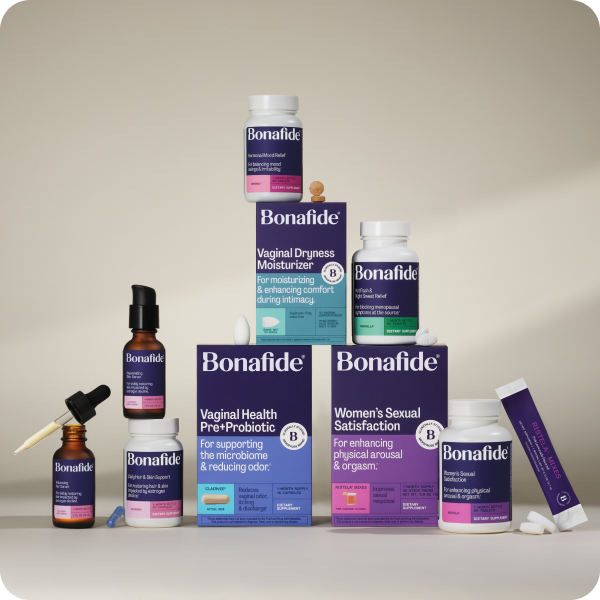Over the last several years there has been a significant focus on women’s health – including an expansion into more dedicated research, specific to women’s health conditions, as well as increased funding around specific women’s health initiatives. But exploring women’s health isn’t a new concept, with a pivotal piece beginning in the early 1990s – it’s known as the Women’s Health Initiative. So, what exactly is The Women’s Health Initiative and how does it support the evolution of women’s health in our country? Keep reading to learn more.
The Women’s Health Initiative (WHI) is a long-term health study sponsored by the National Heart, Lung, and Blood Institute (NHLBI).1 It aims to understand and develop strategies to prevent some of the most common life-threatening conditions affecting postmenopausal women, including heart disease, breast cancer, colorectal cancer, and osteoporosis.2 The WHI is more than a just study; it can be considered a movement that puts women's health issues front and center and it continues to expand its exploration into areas that impact women’s health and aging.
30 Years of Research
The original Women’s Health Initiative study launched in the early 1990s and concluded in 2005 – however, it has continued Extension Studies, which are studies designed to collect longer-term data, that are conducted annually.3 For more than three decades, the WHI has worked to understand not only what the different health issues that affect women are, but also, specifically, how they affect them and what prevention methods are available.
Through their research efforts, the WHI works towards empowering women and healthcare providers with the knowledge and education they need, especially surrounding the menopause transition, postmenopause health and specifically, the impacts of hormone therapy.4 Studies that are a part of this program are dedicated to pinpointing risk factors, developing strategies to prevent health problems, and urging early detection of the conditions that often are associated with menopause and postmenopause.
The Women's Health Initiative has amassed a wealth of data resulting from their studies, with nearly 2,400 published papers exploring various aspects of women's health after menopause.5 The WHI is the largest women’s health prevention study ever conducted and continues to push the evolution of women’s health with its studies.6 Below are some key findings from their research that are worth noting.
Diving into Hormone Replacement Therapy Research
One of the key topics studied consistently by the Women’s Health Initiative is the use of hormone replacement therapy (HRT) and gaining a better understanding of any correlated health impacts – more specifically, how it may affect chronic health conditions, such as cardiovascular disease. Over 161,000 postmenopausal women across the U.S. were enrolled in a revolutionary study, which launched in 1993.7 Researchers followed the health of over 68,000 of the active participants for the next 20 years to gain valuable insights regarding HRT and its effects on chronic diseases, such as those that impact cardiovascular health, stroke risk and blood clots. Peripheral pieces of this study also included a look at HRT’s benefits on certain menopause symptoms, calcium and vitamin D supplementation and its effect on bone health, and the impact of following a low-fat diet.8
This particular study found that while HRT (now sometimes referred to as menopausal hormone therapy) did not prevent cardiovascular disease or other chronic health conditions in women, it could be considered as an effective option to manage some of menopause’s disruptive vasomotor symptoms, like moderate to severe hot flashes and night sweats.9
The Decision to Pause the Combined HRT Arm of the Original WHI Study
It’s important to note that in 2002, the WHI decided to stop the combined (estrogen and progestin) HRT arm of this specific study early, due to concerns over a potential, but small risk tied to the use of these hormones, and no clear benefit toward reducing cardiovascular risks. Findings pointed to a slight uptick in the occurrence of breast cancer, heart disease stroke and blood clots.10
Because of these published results, recommendations and prescriptions for HRT by healthcare providers dropped significantly in following years (2003-2007), and understandably, the results caused some panic in those women who were using these prescription medications, as they believed there may have been more risk than benefit to taking HRT.11, 12
A reanalysis of the combined HRT arm of the WHI study was conducted some years later (2004-2007), noted the original risks the results outlined were over-estimated, and that new findings noted positive benefits associated with the initiation and use of combined HRT in younger women or those in early postmenopause (i.e. 10 years following menopause), and in those over 60 years old. 13, 14 However, skepticism and negative opinions of HRT remained due to the initial results
This study, and the subsequent studies involving WHI and hormone replacement therapy data are just one example of how this research created a spotlight on women's health. Stopping their initial research early, based on the preliminary risks resulting from combined HRT use, did later open the door for more diverse and conclusive studies to take place,15 which serve to better equip women and healthcare providers with more information around treatment options, as well as their risks and benefits.
Decades of research conducted with thousands of women has resulted in data that is helping to pave the way to educating both patients and providers about their health management options. Revisiting and revising this type of research also helps to keep recommendations current and patients, along with providers, updated on benefits and risks to be aware of.
Menopause Treatment Is Not One-Size-Fits-All
One of the more recent findings from the Women’s Health Research Initiative is one that rejects the concept that menopause and its symptoms should be managed with a one-size-fits-all approach.16
When women enter perimenopause, the first official stage of the menopause transition, it’s not uncommon for physicians to offer the recommendation of hormone replacement therapy as a first-line option for symptom management. However, in its latest release, the WHI study shows that it’s essential to consider and create a more tailored, individualized approach to menopause symptom management, as every woman’s experience through this life stage will be unique.
Thanks to 20 years of WHI research, we can understand the value of personalized care. By discussing your unique symptoms and experience with your healthcare provider, you can benefit from playing a role in the development of a symptom management plan that’s tailored to address your specific concerns.
Prior to compiling a symptom management plan, your healthcare provider should ideally consider your medical history, genetics, age, lifestyle and symptoms prior to making any specific recommendations. In addition to HRT, there are also numerous hormone-free treatment options to consider, inclusive of other hormone-free, prescription medications, as well as over-the-counter solutions design to help mitigate symptoms. It’s always best to talk through all of your options with your healthcare provider, so together, you can devise a solution that’s best for you.
Importance of Calcium and Vitamin D Supplementation
In addition to focusing on the impacts of HRT, the Women's Health Initiative study also tackled a peripheral question with their scientific research: can calcium and vitamin D supplementation help to improve bone health after menopause? The reason this question is of interest is because during and after menopause, notable changes in bone health may occur, contributing to conditions, such as osteoporosis.17
Their calcium and vitamin D study, involving over 36,000 participants, delivered valuable findings.18 While the study did demonstrate a modest benefit of supplementation for some, particularly older women in terms of preserving bone mass and preventing hip fractures, supplementation wasn't found to be a universal solution.19
This underscores the importance of exploring a personalized approach to managing your health and wellness – again, as everyone is unique. Consulting with your healthcare provider remains key to determining if something like calcium and vitamin D supplementation aligns with your unique health needs. By working together, you can develop a personalized strategy for maintaining optimal bone health during menopause and beyond – in addition to creating a management plan to ease your overall symptom set.
Personalized Menopause Treatment May Be Key
The Women's Health Initiative has helped to provide insights into women's health, particularly regarding the menopausal transition. Their extensive research provides substantiation around an emerging truth: every woman's experience during this transitional period of life is genuinely unique. While menopause is a universal experience, with every woman experiencing it to some extent, the symptoms and their severity vary greatly. This revolutionary research by the WHI empowers both women and healthcare providers to explore options that best suit their needs.
To be able to better advocate for their health, women should also consider taking the initiative to educate themselves about menopause, understanding the potential spectrum of symptoms and solutions, so that they know what to expect and can feel more empowered when speaking with their healthcare providers. For healthcare providers, the WHI findings highlight the need for individualized treatment plans. Therefore, by working closely with your provider, you can navigate menopause with confidence to land on a path forward that’s best for you.
Resources
- https://www.nhlbi.nih.gov/science/womens-health-initiative-whi
- https://www.whi.org/about-whi
- https://www.whi.org/about-whi
- https://www.nhlbi.nih.gov/science/womens-health-initiative-whi
- https://www.whi.org/papers
- https://www.nhlbi.nih.gov/science/womens-health-initiative-whi
- https://jamanetwork.com/journals/jama/article-abstract/2818206
- https://jamanetwork.com/journals/jama/article-abstract/2818206
- https://jamanetwork.com/journals/jama/article-abstract/2818206
- https://www.womens-health-concern.org/wp-content/uploads/2022/11/10-WHC-FACTSHEET-HRT-The-history-NOV22-A.pdf
- https://www.ncbi.nlm.nih.gov/pmc/articles/PMC6780820/
- https://www.womens-health-concern.org/wp-content/uploads/2022/11/10-WHC-FACTSHEET-HRT-The-history-NOV22-A.pdf
- https://www.ncbi.nlm.nih.gov/pmc/articles/PMC6780820/
- https://www.menopause.org/docs/default-source/professional/nams-2022-hormone-therapy-position-statement.pdf
- https://sp.whi.org/SitePages/WHI%20Hormone%20Trial%20Findings%20Questions%20and%20Answers.aspx
- https://www.nhlbi.nih.gov/news/2024/thirty-years-later-womens-health-initiative-provides-researchers-key-messages
- https://www.endocrine.org/patient-engagement/endocrine-library/menopause-and-bone-loss
- https://sp.whi.org/participants/findings/Pages/cad_fracture.aspx
- https://sp.whi.org/participants/findings/Pages/cad_fracture.aspx










Comments
Post commentMy mom, Marilyn Rudd Fliger (born 1930) was so proud to be part of that study. After she got dementia, I filled out their annual paperwork on her behalf and notified them when she died. She loved knowing that her contribution would help future generations of women.